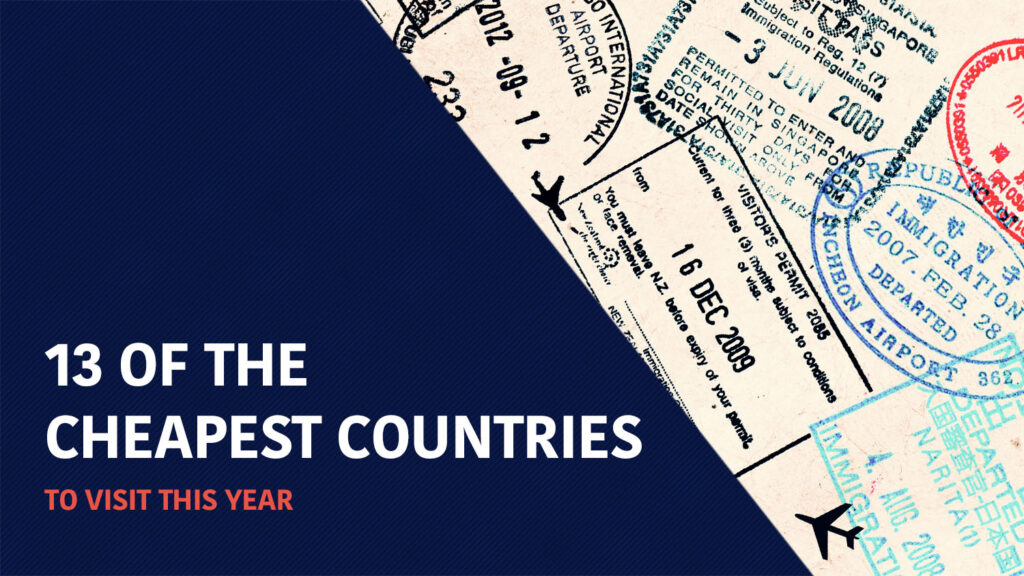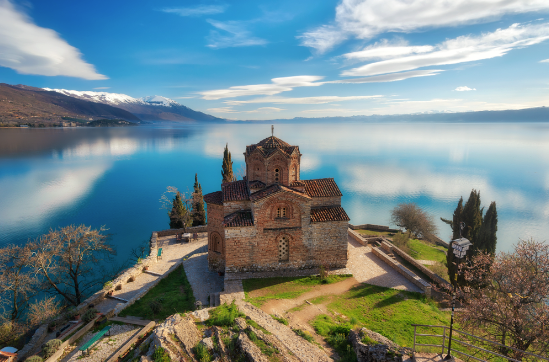 There’s a perception that traveling overseas is prohibitively expensive for most Americans. Nonsense. Or, klam fadi! (as they say in the Jordanian desert)
There’s a perception that traveling overseas is prohibitively expensive for most Americans. Nonsense. Or, klam fadi! (as they say in the Jordanian desert)
Depending on where you live in the U.S. and how long you plan to travel abroad, your cross-pond jaunt might actually end up being cheaper than what you would pay for a comparable length of time in the States. And it will be vastly more memorable than a trip to Tampa.
Below is a short lineup of affordable international getaways, including approximate prices for shoulder season flights, possible accommodations, traditional meals, and activities.
Europe
Kosovo
- Round-trip flight: $749 JFK-PRN (March-April)
- Lodging (one night): $13 shared dorm room; $30 one-bedroom apt.
- Meal: $11 for lamb casserole + roasted veggies + beer + baklava at Tiffany

Once associated with its war-torn independence struggle, the tiny, partially-recognized state of Kosovo should really be known for its exceedingly warm people (even by Balkan standards), underrated food culture, and rock-bottom prices.
Kosovars are welcoming of all visitors, but they really roll out the red carpet for American tourists. Don’t be surprised if you’re invited into a Kosovar home for a marathon meal of highly-Instagramable dishes you’ve never heard of. The epic Skanderbeg steak — rolled meat and gooey cheese, breaded and then fried — is a must-try.
You can burn off the calorically-rich cuisine with a hike through the idyllic Rugova mountain range, which connects Kosovo to two of its stunningly beautiful and stunningly affordable neighbors, Montenegro and Albania.
North Macedonia
- Round-trip flight: $612 JFK-SKP (September)
- Lodging (one night): $13 private room; $22 one-bedroom apt.
- Meal: $6.50 for grilled kebabs + clay pot bean stew (tavče gravče) + salad + mastika liqueur at Kaj Гоце

North Macedonia is one of Europe’s most infrequently visited nooks — which is quite the head-scratcher for anyone who’s ever marveled at its natural beauty. 80% of the landscape is covered in green mountains, complemented by serene lakes and one picturesque village after the next.
Start with a free walking tour in the capital Skopje (one of the best walking tours in all of Europe) to get a sense of Macedonia’s history, cultural mix, and easygoing attitude. Just outside the city is enchanting Matka Canyon, where you can rent a kayak ($5 per hour) to paddle up to ancient churches, monasteries, and stalactite caves.
From Skopje, catch a bus (about $14) to Lake Ohrid for some truly sigh-worthy sunsets. Get to the iconic Church of Saint John early in the afternoon and you might be able to snag your own private cove for a picnic and some quality book time.
Hungary
- Round-trip flight: $600 ORD-BUD (April)
- Lodging (one night): $19 shared dorm room; $44 studio apt.
- Meal: $8 for pork paprikas with egg noodles + sour cherry soup + cabbage salad at Kívánság Étkezde

Highbrow culture and lowbrow prices combine to make Hungary the go-to destination for budget-conscious romantics.
Budapest’s parliament building — one of the most dazzling brick piles ever assembled — is best viewed at sunset from a bench on the other side of the Danube. You can take it all in after enjoying a shot of blood-warming, $2 palinka (fruit brandy) at one of Buda’s cozy, neighborhood borozó taverns, or while sharing enormous Kürtőskalács (buttery, cylindrical cake) with your partner.
After Budapest, hop onto Hungary’s extensive rail network toward more bucolic settings, like the Tokaj wine region or Lake Balaton. Domestic train fares range from around $5 to $15, and you can quickly cover a lot of sites in a country smaller than Kentucky.
Portugal
- Round-trip flight: $580 BOS-OPO (May)
- Lodging (one night): $18.5 shared dorm room; $79 private boat
- Meal: $16 for grilled squid + collared greens soup + caramel pudding + house wine at O Buraco

Tolerance ain’t cheap, and many of the most popular LGBTQ+-friendly travel destinations are prohibitively expensive. But la República Portuguesa is a refreshingly open mix of queers, Catholics, vegans, carnivores, fisherwomen, dandies, nuns, and nudists. And its prices are by far the lowest of any country in Western Europe.
Whatever your tribe, you’ll find the northern namesake city of Porto as beguiling as anyone else who’s ever visited. Abandon definitive sightseeing plans and just amble through a maze of medieval streets in bohemian Ribeira. After evening settles in, open your phone and navigate to Bar of Soap, where you can sip a signature Porto Tonic while trying your luck at drag bingo.
Tired of the mainland? Jet on over to the no-place-can-really-be-this-beautiful Azores archipelago. Airfare will be the best $100 you’ve ever spent, unless you have something against white sand beaches, volcanic vistas, and 70-foot blue whales.
The Americas
Argentina
- Round-trip flight: $837 FLL-EZE (November)
- Lodging (one night): $18 shared dorm room; $23 entire apartment
- Meal: $25 for 14oz filet mignon + mashed potatoes + arugula salad + bread pudding at Parilla Cero 5

Argentina is a rare playground for both arts aficionados and nature enthusiasts. Melomaniacs will be left breathless by the opulent Teatro Colón, one of the world’s finest venues (if not the finest) for opera and symphonic music. Entrance to a Colón performance can cost as little as $5 to $6 — about 1/5 the price of a comparable ticket in New York or London. And between shows, you can take private tango lessons for a fraction of what you’d pay stateside.
Prefer to trek rather than tango your way through South America? Semi-affordable domestic flights take you into the hikers’ paradise Patagonia. But there are more cost-effective, environmentally-friendly buses that connect to the hinterland’s major jump-off cities, like Puerto Madryn and El Chaltén. An 18-hour bus ride might sound unbearable, but fully-reclining seats and a bottle of quality Malbec (≈ $2) will do wonders for your mood. And the penguins and glaciers galore are worth the schlep.
Note: In an effort to discourage cash use and limit inflation, Argentina has implemented a special, super-low exchange rate for purchases made with non-Argentinian credit cards. Basically, when you use a U.S. credit card in Argentina you get nearly twice the pesos you would normally nab when withdrawing cash from an ATM. And while it’s wise to carry at least some cash in less developed countries, credit cards are safer and more cost effective than repeated ATM trips (provided your card doesn’t charge foreign transaction fees).
» MORE: Best travel rewards credit cards
Brazil
- Round-trip flight: $831 MIA-GIG (September)
- Lodging (one night): $16 shared dorm room + breakfast; $26 private floor of a home
- Meal: $15 for seafood stew + coconut banana rice + salad + cachaça cocktail at Yayá

Picture this: You’re walking along a white sand beach, sipping coconut juice (directly from a coconut, that costs about $1.50), humming the melody of “The Girl from Ipanema” when you meet the actual Girl from Ipanema (now in her 70s; still a knockout), and she invites you to an informal, free samba circle later that night.
This could totally happen to you in Brazil. Why? Because magical. things. happen. in. Brazil. And at very affordable prices.
Feeling spiritual? Take a train through Rio de Janeiro’s lush urban forest (about $18) up to the indescribably massive, 635-ton Christ the Redeemer statue. While JC might be the star, the mugging monkeys at his feet are an amusing sideshow.
Care to bathe in the rainbow shimmer-mist of Iguaçu Falls (aka ‘that makes Niagara look like my leaky bathroom faucet’)? It’s about $12.70 for park entrance. Or $80 for a jungle walk + boat ride to the base of the astonishing torrent.
Fancy a 5-day ferry down the Amazon all the way to the Atlantic Ocean? $155 for a contemplative, old-school Manaus to Belém cruise is a bargain.
Asia
Jordan
- Round-trip flight: $732 JFK-AMM (February/March. But be mindful of Ramadan.)
- Lodging (one night): $16 Bedouin desert tent (including meals); $33 studio apartment
- Meal: $11 for lamb kofta + tabbouleh + baba ghanoush at Alshinawi

Jordan is a gift to anyone who wants a spectacular vacation, in a short amount of time, at a low cost. The desert marvel offers a quartet of ‘musts,’ which are quite affordably priced given their bucket-listyness.
Petra. The ancient Nabatean kingdom is an open-air, sandstone museum with unforgettable temples, tomb-lined canyons, well-preserved mosaics, and an enormous amphitheater. About $80 for a two-day pass.
Wadi Rum. Like your deserts pretty in pink? A full-day, guided 4×4 tour through Earth’s closest approximation to Mars starts from $78.
The Dead Sea. No need to work on your breaststroke before visiting the lowest point on earth, as the Dead Sea’s dense salinity allows you to effortlessly float. Free access from this beach.
The Red Sea. Paradise for anyone who loves coral reefs and colorful sea critters. $50 for a guided dive.
All of the above are within a three-hour drive of one another and will set you back about $200. More importantly: Camel sightings are complimentary, abundant, and unavoidable.
Kyrgyzstan
- Round-trip flight: $1,448 JFK-FRU (July)
- Lodging (one night): $7 shared dorm room; $23 private yurt + breakfast
- Meal: $16.50 for horse rib + smoked trout with radish salad + vodka at Frunze

Before there was glamping, there was yurting. Overnighting in a yurt — the traditional domicile of nomadic Central Asian sheepherders — is one of myriad charms awaiting those who visit entirely mountainous, serene Kyrgystan. It’s not exactly the most convenient travel destination airfare-wise, but as a Kyrgyzophile once explained to me: Convenience and adventure rarely intersect.
The jewel in the Kyrgyz crown is arguably Issyk-Kul lake and its surrounding wetland biosphere. Stepping onto the lake’s warm sandy beaches in the peak of summer, while staring at the inexplicably snowy Tengri Tagh (“Mountains of Heaven”) that envelope the lake, is pleasantly disorienting.
Can’t get to Central Asia until after summer passes? You’ll instead arrive in the fall/winter eagle hunting season, in which horse-mounted berkutchi hunters send their highly-trained Golden Eagles to retrieve rabbits, foxes, and even wolves.
Uzbekistan
- Round-trip flight: $1,076 JFK-TAS (April)
- Lodging (one night): $12 shared dorm room + breakfast; $18 private room + breakfast
- Meal: $9.50 for lamb plov + stuffed grape leaves + salad at Caravan

If Kyrgystan fulfills your need for pastoral bliss, Uzbekistan delivers on ancient urban unfamiliar. Its key Silk Road cities — Bukhara, Samarkand, and Khiva — are an architecture and/or history buff’s Disneyland, and are as enchanting today as they were when Alexander the Great, Genghis Khan, and Marco Polo once trotted in.
Sightseeing in Uzbekistan can be cheap or cheaper. Entrance to Samarkand’s stunning Registan Ensemble (public square and three gorgeous madrasahs) is about $4 or so. A 5-hour, English-guided tour of Bukhara is a well-spent $30 and can be followed by a $25 sauna + skin scrub + massage at the historic Bozori Kord Hammam (traditional bathhouse). Cap the day off with Tajik green tea and a series of delectable sesame and pistachio confections at the Silk Road Tea House for $5.
Malaysia
- Round-trip flight: $1,327 LAX-KUL (July/August)
- Lodging (one night): $9 shared dorm room; $32 for one-bedroom apartment
- Meal: $2.50 for a large bowl of braised duck meat noodle soup (koay teow th’ng) with fish balls and greens + chrysanthemum tea at Restaurant 113

Ever get the sense that you’re a little more food-curious/obsessed than your peers? Malaysians are your kind of people.
The majority of Malaysian millennials eat out at least every other day. And why not? Their food culture is diverse, unpretentious, and cheap cheap cheap.
A Southeast Asian grub odyssey should start in the colonial city George Town, which is widely considered Malaysia’s gastronomic capital, and designated a UNESCO World Heritage Site for its mix of Malay, Han Chinese, Tamil, and European cultural influence.
Do some preliminary research at Wonderfood Museum ($8 entry fee), which introduces tourists to the breadth of Malaysian cuisine via plastic reproductions of various recipes. Once you’ve lost track of the number of dishes you plan to taste, take a 15-minute walk to a nearby food market, like Kimberley Street. Below are some of the definitive local treats to try there:
- Roti canai — pan-fried flatbread served with a variety of curries. Recently named the best street food in the world by Taste Atlas.
- Assam laksa — sour/spicy/sweet soup made with mackerel fish stock, tamarind, torch ginger, and noodles
- Char kway teow — fried flat rice noodles with shrimp, eggs, cockles, etc.
- Sate — skewers of succulent meat served with peanut sauce and chili paste
- Hainanese chicken rice — poached chicken and fragrant rice. Beware: It’s geopolitically sensitive.
- Cendol — refreshing dessert with shaved ice, coconut milk, green pandan jelly, and fruit
Africa
Ghana
- Round-trip flight: $1,140 IAD-ACC (February)
- Lodging (one night): $14 shared dorm room; $20 private double room + breakfast
- Meal: $9 for vegan fufu soup + salad + pineapple crumble at Tatale

Ghana is an ideal starting point for anyone interested in West African culture. And the best part of your trip — chumming with Ghanaians — won’t cost a single cedi.
A good icebreaker for making Ghanaian friends is to learn and introduce yourself by your full day of the week name. Follow that up with an impromptu lesson in Ghana’s ‘snap’ handshake to fully endear yourself to your hosts. Hopefully, your new pals might be charmed enough to join you for a beach day at Kokrobite, which you can get to via tro-tro (shared taxi) for around $0.70.
Contemporary Ghana’s congenial, upbeat vibe must be contextualized with a sobering look at its history. A guided tour of Cape Coast Castle, which once imprisoned slaves before they were trafficked across the Atlantic, should be legally mandated for any American tourist in Africa. A bus from Accra to Cape Coast costs about $6, and entrance to the castle is $2.75.
Domestic travel fares to other can’t-miss parts of Ghana, like cultural capital Kumasi, are similarly low, even if you elect to fly rather than bus it. Just leave room in your return luggage for the kente cloth and Ashanti sandals you’ll find at the city-sized Kejetia Market.
Namibia
- Round-trip flight: $1,369 JFK-WDA (May)
- Lodging (one night): $17 shared dorm room; $29 private double room
- Meal: $12.50 for grilled kingklip fish + baked potato + salad + local beer at The Fish Deli

Sparsely populated Namibia is a perfect alternative to more tourist-trodden national parks in the U.S., and it’s one of Africa’s best choices for group road trips and camping. You can rent a 4×4 with tents, bedding, cooking equipment, etc. from around $80 per day for a 3-week trip.
Namibia’s premier attraction is perhaps the Etosha salt pan and surrounding wildlife sanctuary, a fauna-fest of ostriches, honey badgers, and white rhinos, to name but a few standout species. From there you can head southwest toward Walvis Bay for flamingo and pelican-watching, along with a guided kayaking trip in waters teeming with surprisingly social seals (about $60 per person).
Shutterbugs can end the trip with a visit to the Namib Sand Sea, known for its surreal, 300-foot+ orange dunes (some of which are easily accessible by road) and dead-but-photogenic camel thorn trees.
Zambia
- Round-trip flight: $1,670 IAD-LUN (September)
- Lodging (one night): $19 shared dorm room: $30 private room + breakfast
- Meal: $9.50 for goat stew + cassava porridge + house veggies + Zambian beer at Mpoto Yathu

Zambia is surprisingly under-traveled compared to regional household names like South Africa and Kenya. But what it lacks in PR it more than makes up for in unspoiled beauty.
With its key attractions spread out across an area larger than Texas, Zambia is best suited to journeys of three weeks or more. Start by visiting mile-wide, jaw-dropping Mosi-oa-Tunya (aka Victoria Falls) for a $20 entrance fee. After drying off you can take an overnight train ($8 for a sleeper cabin) to the capital city Lusaka. Renting a car from there allows you to unwind on the isolated southern beaches of Tanganyika, a lake so massive it feels more like a sea.
The trip is incomplete without a visit to South Luangwa National Park. It’s a dream safari in the dry season (July to October), when crowds of elephants, giraffes, and zebras forage along the banks of the Zambezi river’s tributaries, and are tracked by hungry lions and leopards. There’s a widespread misconception that the park is financially out of reach for budget travelers, but you can keep costs reasonable by selecting an affordable tour operator, for which all-inclusive packages (lodging, food, and excursions) start at $209 per day.
Cheapest countries to fly to
The countries highlighted in this article are affordable across a range of travel expenses, including grub, housing, sightseeing, and domestic transit. But they’re not always cheap to get to. And after factoring in airfare, some are only truly cost effective if you can stay for a few weeks or longer.
If you’re craving a foreign escape but you have a relatively short window of time to travel, you might want to zero in on destinations with low-cost airfare (which, for U.S.-based travelers typically = countries in Central America and the Caribbean).
Below are some of the cheapest countries to fly to from the three most popular U.S. airports. Approximate airfare prices are round trip.
ATL Hartsfield-Jackson Atlanta International
- Dominican Republic ≈ $170 in February/March via Frontier
- Mexico ≈ $175 in February/March via Frontier
- Jamaica ≈ $237 in May via Frontier
LAX Los Angeles International Airport
- Canada ≈ $104 in April via Flair
- Mexico ≈ $180 in February/March via Viva Aerobus
- Costa Rica ≈ $213 in August via Volaris
ORD Chicago O’Hare International Airport
- Mexico ≈ $218 in May via Volaris
- Canada ≈ $241 in April via American Airlines
- Colombia ≈ $383 in January via Spirit
How to choose your destination
The randomized ‘spin the globe and see where it stops’ method of decision-making does have its merits. But consider the below before you give Skyscanner your credit card deets.
Travel interests
Ever asked yourself, ‘Why all the wanderlust?’ We all want to get away for different reasons, and doing some preemptive soul-searching can help you better predict which countries you’ll truly vibe with.
Poland’s conveyor belt of medieval villages will captivate anyone who’s fond of cobblestone streets and Brick Gothic castles. But its conveyor belt of potatoes (followed by more potatoes) will bore insatiable chow-hounds, who should pay the extra airfare to get to a bonafide gastroparadise, like Malaysia.
Ease of domestic travel
Is there enough to do in one small region, or will you need to be mobile to feel satisfied with your trip?
Transit costs won’t be too much of a factor if you plan on confining your visit to one city — and there are some megacities where you can spend weeks without a moment of boredom (hello Istanbul). But trying to reach two far-flung locales within one ginormous country can bloat your budget, particularly if public transit options are limited.
And keep in mind that two comparably developed countries may have completely different levels of public transit access. India’s vast rail network makes it a haven for low-cost inter-city travel. But ask a Brazilian about trains from Rio to Salvador and expect a dumbfounded, ‘Hã?’
Medical care
If you have a history of medical issues, it shouldn’t categorically prevent you from traveling overseas. But it might influence your destination choice. Low cost of living/travel often correlates to limited health care infrastructure, though there are some exceptions (e.g., Portugal).
Uncle Sam’s input
Always check the U.S. Department of State’s travel advisories just before buying an international flight, and check again in the days leading up to your departure.
All of the countries featured in this article had Level 1 or 2 advisories at the time of publication. A number of places that otherwise would have featured on this list — like Nicaragua, Peru, or Egypt — were omitted due to an increased risk assessment.
If your planned destination is currently safe but historically prone to turmoil, consider booking refundable flights and lodging. And check that your travel insurance will cover an early return home in the event of an outbreak of violence or a natural disaster.
There’s nothing more economical than an open mind
It’s a bummer if you’re priced out of traveling in a fabulous yet exorbitantly expensive locale.
But there are nearly 200 different countries scattered around our shared rock today. And for every Switzerland and Singapore (or, for that matter, United States), remember that there’s an equally exciting and less wallet-crippling alternative waiting for you to visit.

